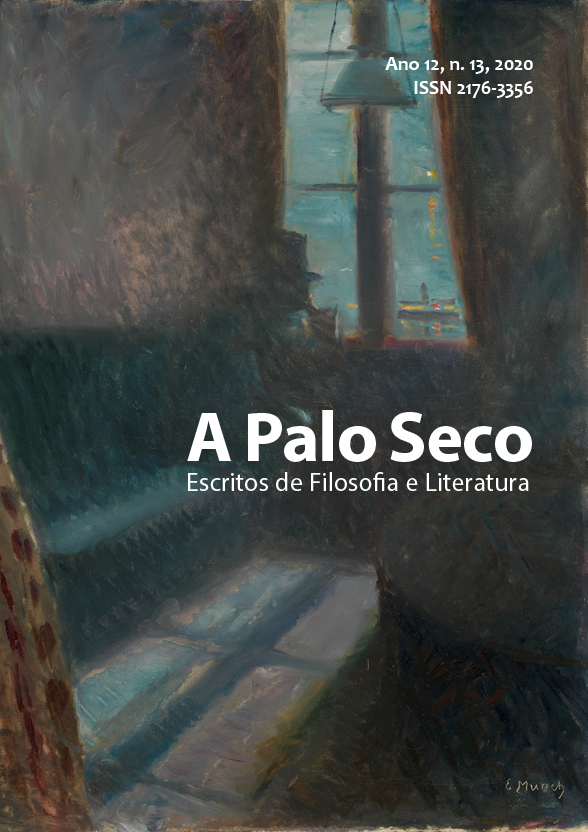Hegel e a ironia romântica: racionalidade, direito e saber
Keywords:
Hegel, Irony, Romanticism, F. SchlegelAbstract
Hegel’s positions on Romantic Irony are evaluated in selected passages of his corpus, specifically his studies on the poetic in Aesthetics Courses. Taking into account the multiplicity of considerations and interpretations of romantic movements, these philosophical inquiries contribute to an evaluation of the scientific, historical and political proposals during a remarkable intellectual period in Germanic territories. In contrast to the ideas of F. Schlegel and Novalis, Hegel emphasizes the Socratic use of the concept of irony, while trends classified as romantic exhibit antitheses that are impossible to be overcome through rational thinking. As an introductory way of discussing the poetic in a dialogue between Hegel and the romantics, this essay opts to study the Hegelian critique of irony present in Friedrich Schlegel’s texts. For Hegel the unveiling of Geist and the search for self-awareness affords the possibility of a rational realization through historical transformations and forms that permeate intellectuality and social life.
References
BEHLER, Ernst. German romantic literary theory. Cambridge: Cambridge University Press, 1993.
BEISER, Frederick. German idealism: thestruggle against subjectivism: 1781-1801. Cambridge: Havard University Press, 2002.
BEISER, Frederick. The fate of reason: german philosophy from Kant to Fichte. Cambridge: Havard University Press, 1987.
BERLIN, Isaiah. The roots of romanticism. Princeton: Princeton University Press, 2013.
BOWIE, Andrew. Aesthetics and subjectivity: from Kant to Nietzsche. Manchester: Manchester University Press, 2003.
COWAN, Scott Jonathan. Hegel between criticism And romanticism: love & self-consciousness in the phenomenology. Master Thesis in Philosophy at University of Winconsin-Milwaukee. 2017.
FERRATER MORA, José. Diccionario de filosofía Q-Z. Barcelona: Ariel, 2004.
FRANK, Manfred. The philosophical foundations of early german romanticism. Albany: SUNY Press, 2004.
GONÇALVES, Márcia. A morte e a vida da arte. Kriterion, v. 45, p.46-56, 2004.
HARTMANN, Nicolai. A filosofia do idealismo alemão. Lisboa: Fundação Calouste Gulbekian, 1983.
HEGEL, G.W.F. Fenomenologia do espírito. Petrópolis: Vozes, 2003.
HEGEL, G.W.F. Filosofia do direito. São Paulo: Loyola, 2010.
HEGEL, G.W.F. Cursos de estética. Volume I. São Paulo: Edusp, 2001.
HEGEL, G.W.F. Enciclopedia de las ciencias filosóficas. Madrid: Alianza Universidad, 2005.
HONDERICH, Ted. The Oxford companion to philosophy. Oxford: Oxford University Press, 1995.
INWOOD, M. J. A Hegel dictionary. Oxford: Blackwell Publishers, 1992.
KOMPRIDIS, Nikolas. Philiosophical romanticism. London: Routledge, 2006.
LACOUE-LABARTHE, Philippe e NANCY, Jean-Luc. The literary absolute: the theory of literature in german romanticism. Albany: SUNY Press, 1988.
MARKUS, Gyorgy. Hegel and the End of Art. Literature and aesthetics, v.6, p.7-26, 1996.
NOVALIS. Miscellaneous Remarks. In: BERNSTEIN M. (Org.). Classic and romantic german aesthetics. Cambridge: Cambridge University Press, 2003, p. 203-214.
REALE, G. e ANTISERI, D. História da filosofia vol 5: Do romantismo ao empiriocriticismo. São Paulo: Paulus, 2005.
RIBEIRO, Nuno. Fernando Pessoa leitor de Novalis e o problema da heteronímia. Scripta, v.16, n.31, p.53-70, 2012.
SAFRANSKI, Rüdinger. Romantismo: uma questão alemã. São Paulo: Companhia das Letras, 2010.
SCHLEGEL, Friedrich. Athenaeum fragments. In: BERNSTEIN M. (Org.). Classic and romantic german aesthetics. Cambridge: Cambridge University Press, 2003a, p. 246-260.
SCHLEGEL, Friedrich. Critical Fragments. In: BERNSTEIN M. (Org.). Classic and romantic german aesthetics. Cambridge: Cambridge University Press, 2003b, p. 239-245.
SCHLEGEL, Friedrich. Ideas. In: BERNSTEIN M. (Org.). Classic and romantic german aesthetics. Cambridge: Cambridge University Press, 2003c, 261-268.
Published
How to Cite
Issue
Section
License
O/A autor/a deverá concordar com os termos da Declaração de Direitos Autorais, no qual cede à revista A Palo Seco – Escritos de Filosofia e Literatura como detentora dos direitos autorais da publicação.
1. As opiniões expressas nos textos submetidos à revista A Palo Seco – Escritos de Filosofia e Literatura são de responsabilidade do/a autor/a.
2. Autores/as conservam os direitos de autor/a e concedem à revista o direito de primeira publicação, com o trabalho simultaneamente licenciado sob a Licença Creative Commons Attribution que permite a partilha do trabalho com reconhecimento da autoria e publicação inicial nesta revista.
3. O/A autor/a comprometem-se a seguir as “Normas para submissão de manuscritos”, na plataforma SEER.
4. Compete aos/às autores/as aceitar as sugestões de alterações na submissão, quando encaminhadas por sugestão dos/as avaliadores/as, Revisores/as Científicos e/ou da Comissão Executiva. Sempre que houver alterações de que os/as autores/as discordem, devem ser apresentadas as respectivas justificações, se for o caso.
5. A reprodução de material sujeito a direitos de autor/a foi antecipadamente autorizada.
6. Os textos são originais, não publicados nem submetidos a outras revistas.
Licença Creative Commons CC BY-SA (Atribuição - Compartilha Igual) 4.0 Internacional.








